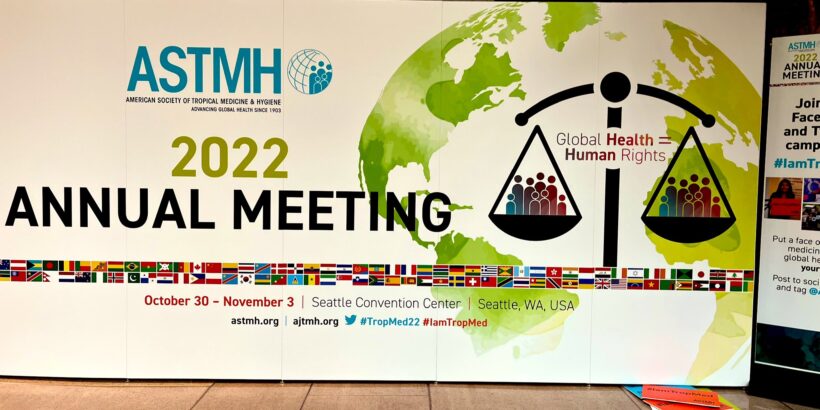Each year, the American Society for Tropical Medicine and Hygiene (ASTMH) annual meeting brings together scientists and researchers from around the world to share the latest data on tropical medicine and global health. When COVID-19 upended in-person events in 2020, ASTMH moved to a fully online format for two years. This year, we reunited in Seattle, Washington. Among the global health professionals who gathered were members of the typhoid community. Their posters, oral abstracts, and symposiums represented our collective perseverance through the past two and a half years and showed how we maintained momentum to take on typhoid through the pandemic.
Sharing progress made
The Coalition against Typhoid hosted a symposium titled “Advances in Enteric Fever Diagnostics”. The four presentations by Kristen Aiemjoy, Sira Jam Munira, Jyotshna Sapkota and Purvesh Khatri featured discussions on the accuracy of new antigens for diagnosis, evaluation of the Dual Path Platform (DPP) typhoid rapid diagnostic, access to points of care test and a robust host-response-based. Existing diagnostics for enteric fever do not meet standards for accuracy, cost, and speed. Newer generation serologies have estimated sensitivity of 69-78% and specificity of 87-90%, falling short of recently proposed target product profiles for enteric fever diagnostics. However, this is promising progress as research and development for more sensitive diagnostics in the pipeline. New options for point of care diagnostics are critical to take on typhoid and to give low and lower-middle income countries without the capacity to accurately assess burden of disease or recognize outbreaks, a more effective tool to care for their constituents.
Dr. Farah Qamar (Aga Khan University, Karachi, Pakistan) presented “Field Evaluation of Typhoid conjugate vaccine in a catch-up campaign among children aged 9 months to 15 years in Sindh, Pakistan.” This presentation shared results from a field evaluation that measured the effectiveness of the typhoid conjugate vaccine (TCV) during a one-time catch-up campaign. Researchers found TCV to be highly effective. Researchers also found that 61% of blood culture confirmed S. Typhi cases were extensively drug resistant (XDR), highlighting the significant burden of antibiotic resistance in the region. Although the study demonstrated TCV’s effectiveness in a campaign setting, it also emphasized the importance of TCVs integrated with water, sanitation, and hygiene. With the recent conclusion of Pakistan’s national TCV rollout we look forward to additional data to inform future decision-making.
Several poster presentations throughout the week featured typhoid research. Topics ranged from co- infection of typhoid and malaria, impact of COVID-19 on typhoid surveillance, serological response, and others.
Maintaining the momentum
Although we were able to gather and share the progress of the past year, now is not the time to settle. To take on typhoid, we must keep the momentum. ASTMH provided a collaborative forum for the typhoid community to do just that. The more we achieve, the more we know. Sharing these experiences throughout the global health community and continuing to apply the lessons learned together will be key to paving the path forward for a sustained reduction in typhoid by 2030.



